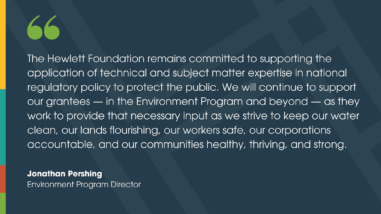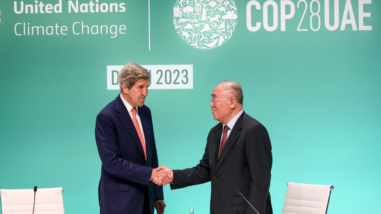University of Maryland
For Analysis Of EPA Rules And U.S. Emission Reduction Targets
-
Amount$200,000
-
Program
-
Date Awarded2/28/2014
-
Term18 Months
-
Type of SupportProject
Strategies
Overview
With support from the Hewlett Foundation, the University of Maryland would provide a Fellow to the Council on Environmental Quality (CEQ) for eighteen months as part of an Intergovernmental Personnel Act agreement. As part of his/her job responsibilities, the Fellow is expected to provide technical and policy analysis and advise on important agency rules to reduce carbon emissions.
About the Grantee
Grantee Website
www.umd.edu
Address
Office of Research Administration, 3112 Lee Building, College Park, MD, 20742, United States
Grants to this Grantee
for monitoring coalitions of climate action through the Climate Constituencies Project
The Climate Constituencies Project at the University of Maryland will analyze constituencies to understand political polarization and echo chambers in American climate politics. This research will help explain how climate policy actors situate themselves within relevant coalitions and in the broader network in terms of their tactics, targets, constituencies, and collaborations. (Substrategy: U.S. National Policy)
for the China program and other key countries
To support University of Maryland’s effort in facilitating the implementation of the U.S.-China Joint Glasgow Declaration on Enhancing Climate Action, and related strategies in the emerging economies. It focuses on accelerating coal consumption reduction, methane analysis and action pathways, deforestation reduction in supply chain and material flows, industry decarbonization and programmatic support for the US government engagement and collaborative analysis in other key countries. (Substrategy: China National Policy)
for strategies to support a rapid energy transition in Germany
The Center for Global Sustainability (CGS) at the University of Maryland will explore feasible, low-cost pathways for Germany to safely transition away from its current energy approach in the near term — specifically, for the upcoming winter season and in three to five years — and to support the nation in avoiding poor investment decisions that lock Germany into a fossil-dependent path incompatible with a global 1.5 Celsius trajectory. (Substrategy: Electrification)



